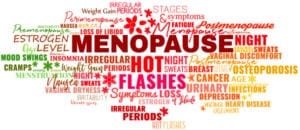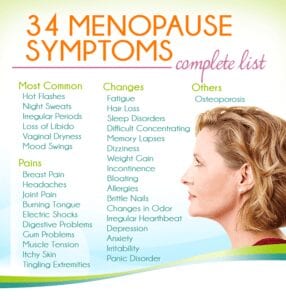What is Menopause?
Blue indicates link

Menopause is when your periods stop permanently and you’ll not get pregnant. You have reached menopause only after it’s been a full year since your last period. This means you’ve not had any bleeding, including spotting, for 12 months in a row. After your periods have stopped, the female reproductive organs (ovaries) make very low levels of the hormones that help develop and maintain both the reproductive system and female characteristics, such as breasts and pubic hair(estrogen), and progesterone. The low hormone levels may increase the risk of developing other health problems.
Symptoms of Menopause
- Irregular periods
- Vaginal dryness
- Hot flashes
- Chills
- Night sweats
- Sleep problems
- Mood changes
- Weight gain and slowed metabolism
- Thinning hair and dry skin
- Loss of breast fullness
Symptoms may vary and the signs and symptoms may differ between women. It is likely that you simply may have irregular periods before the end of this cycle. Vaginal dryness may be a sign of the genital urinary syndrome of menopause. Vaginal tissues start to become thinner and more easily irritated, this leads to the decline of estrogen levels during menopause. A flush could also be a sudden feeling of heat within the upper body, which is typically most intense over the face, neck, and chest.
Your skin might redden as if you are blushing. A hot flash can also cause sweating. If you lose an excessive amount of body heat, you could possibly feel chilled afterward. Night sweats are hot flashes that happen in the dark, which may disrupt your sleep. Hot flashes are commonly due to menopause at the time but may also be triggered by other medical conditions. The foremost common symptom of the menopausal transition is when a woman’s menstrual periods become irregular and eventually stop.
Dealing with Menopause
Hot Flashes:
During the day, dress in layers in order that you will have garments when needed. If possible, regulate the air conditioning and warmth in your environment to accommodate your temperature changes. If you awaken hot in the dark, sleep in a cool room. Go to bed with a frozen cold pack under your pillow, and switch the pillow over once you awaken. Keep a change of nightclothes next to your bed in order that you can change easily if you awaken soaked.
Some women find deep breathing exercises helpful. Research suggests that there is a way called paced respiration that can cut in half the frequency of hot flashes. Take slow deep full breaths by expanding and contracting your stomach while inhaling and exhaling at a rate of about six to eight breaths per minute. One of the simplest ways to find outpaced respiration is by taking a yoga class. Practice this system twice each day for fifteen minutes. You can also use paced respiration whenever you are feeling a flush approaching.
Vaginal Changes:
Lower estrogen levels cause the vaginal lining to thin and vaginal discharges to diminish. The vagina also becomes shorter and narrower. The result often is dryness and irritation, which may make sexual activity unpleasant. Inflammation of the vagina wall may also occur. It isn’t an infection, but if it’s not treated, further thinning and ulceration of the vagina may occur; this will cause bleeding or make intercourse or pelvic exams painful at best, and impossible at worst. It is important to keep in mind that there is a spread of conditions aside from menopause that will cause painful intercourse, so consulting a clinician is advisable.
Irregular Uterine Bleeding
The inner layer of tissue inside your uterus shrinks slightly which may cause uterine bleeding. These periods vary in different women. Periods may often be heavy or more frequent. If this situation becomes too frequent it is recommended to consult with your doctor to make sure you do not have any other health ailments.
Irregular periods
In the early stages, your cycle may shorten, with periods beginning before you expect. Maybe your periods used to come every 28 days, exactly at 3:15 p.m. Now, they’ll still come at 3:15 p.m., but the cycle is every 24 or 26 days. But any pattern is possible. Bleeding also may become lighter or heavier. Going for 3 months without a period suggests menopause is at hand, although about 20% of girls have regular periods again after such an occurrence.
These irregular patterns could also be exacerbated by other gynecologic problems common in midlife, for instance, uterine growths like polyps or fibroids. During this time there is a decline in your fertility, accompanied by irregular periods, which may become stressful and an emotional issue for girls who still want to become pregnant.
Mood Swings and Depression
A diminished estrogen level may be the cause of mood swings and depression but this has not been proven, but it’s possible that mood changes result when hormonal shifts disrupt the established patterns of a woman’s life. The changes can often be stressful. Certain mood swings may cause laughing at one minute and crying the next minute subsequently, it may also cause a person to feel anxious or depressed. These changes are transient however and don’t usually meet the standards for a diagnosis of depressive disorder.
Although women who have had previous episodes of depression could also be susceptible to a recurrence during perimenopause, menopause in and of itself doesn’t cause depressive disorder. The incidence of depression in postmenopausal women isn’t any more at another time in life. Disrupted sleep from night sweats can cause a lady to feel fatigued and irritable.
In some cases perimenopause may coincide with many of life’s stresses, children who are teenagers or leaving home, peaking professional responsibilities, illness or death of elderly parents, and aging itself. These events, combined with unpredictable hormonal changes, can leave a lady feeling fatigued, overwhelmed, and out of control.
Insomnia
Insomnia can also be a problem for ladies who do not have hot flashes. Some women may have difficulty falling asleep, but a standard pattern is to sleep for a couple of hours, awaken too early, and not be ready to fall back to sleep. It is unknown if disruptions in sleep are due to hormonal changes. Sleep cycles change as people age, and insomnia may be a common age related complaint.
The problem may be a troublesome one that will leave sleep deprived women fatigued, tense, irritable, and moody. Insomnia isn’t a trivial matter, as sleep problems even have been related to heart attacks and congestive coronary failure
Weight gain
Although weight gain may be a significant issue for tons of girls during this age bracket, there is no clear evidence that it is a direct result of hormone changes or maybe age. Instead, the classic middle-aged weight gains seemed to stem from a variety of factors, including the fact that older women (and men) are simply less physically active. Weight gain in midlife may also be due, in part, to a slowdown in metabolism.
Urinary incontinence
Urinary problems persist and worsen in postmenopause because changes within the urinary anatomy occur with general aging as well as estrogen loss. Some other causes of nighttime incontinence include bladder and urethral infections, muscle weakness caused by aging or injuries during childbirth, and a few sorts of prescription medication.

Natural Herbal Relief for Menopause
Black Cohosh
For many women, this is a miracle drug. It comes from the root of the plant Cimicifuga Rascemosa which is found in many parts of the world. The root, which can be quite smelly, is harvested, cleaned, dried, and ground, and then used in capsules or as a tea. Whatever application you choose, it will take a while to show effects. It gets into the system slowly and builds up over time.
Hawthorn
Hawthorn berries are like little crab apples, but they come from a different tree. Hawthorn works to strengthen veins and arteries, helping blood to flow better to vital areas.
Ginseng
Ginseng is a non-toxic plant that is marketed as helping the body to resist stressors of all kinds. This enables your body to endure stressful situations.
Soy
For some women, soy will help to relieve hot flashes. It is recommended to use only non-GMO soy products.
Dealing With Menopause Naturally Video
Saw Palmetto
Saw palmetto has been used in men for a long time to help with the prostate gland. Now it’s been found that some women in menopause can benefit from it too.
Eliminating Caffeine
Some women benefit from cutting caffeine during menopause. Some say it stops hot flashes entirely.
Yarrow
Yarrow is good for all kinds of issues, including hot flashes or night sweats. Use it as a tincture or tea. It’s bitter, so it’s best when mixed with something.
Always consult with your doctor before taking any herbal alternatives.
Thank you for reading
Michael
Comments are welcome
What a great post, I am only 20 but I will keep this when I am older so I know what I’m doing then. Thanks for this post.
Seeing you talk about ginseng, I have a post on my site about this herb if you want me to link to your site.
Hi Rebekah,
Thank you for your comments. You still have a long ways to go. Yes, I would be interested in looking at your link to ginseng as I am a believer in herbal remedies.
All the best,
Michael